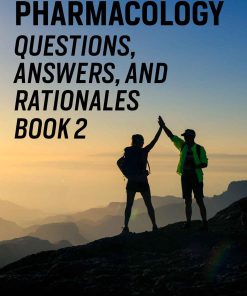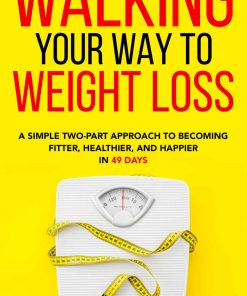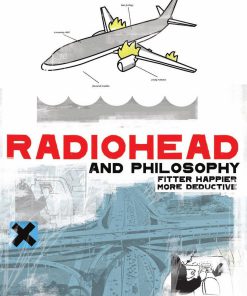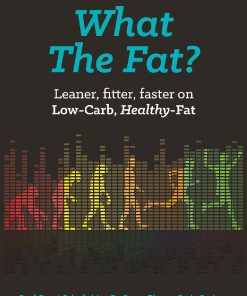Faster Fitter Happier 75 questions with a Sport Psychologist 1st Edition by Tony Westbury ISBN 9781138696136 1138696137
$50.00 Original price was: $50.00.$25.00Current price is: $25.00.
Faster Fitter Happier 75 questions with a Sport Psychologist 1st Edition by Tony Westbury – Ebook PDF Instant Download/Delivery: 9781138696136 ,1138696137
Full download Faster Fitter Happier 75 questions with a Sport Psychologist 1st Edition after payment
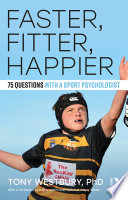
Product details:
ISBN 10: 1138696137
ISBN 13: 9781138696136
Author: Tony Westbury
Faster Fitter Happier 75 questions with a Sport Psychologist 1st Edition Table of contents:
I Why Do We Need a Psychology of Sport?
What’s This Book About?
The Questions Have Determined the Structure and Content of This Book
It Depends!
Evidence-Based Practice Vs. Practice-Based Evidence
Is Sport Psychology Really Psychology?
Where Does Sport Psychology Fit Into Preparation to Perform?
Sport is 100% Mental!
The $64,000 Question: Does Sport Psychology Work?
A Philosophy of Practice
Myths and Misconceptions
My Invitation
Bibliography
II Do I Need Sport Psychology?
Introduction
The Mind and Body Fallacy – If You Are Fit Enough, You Must Be Mentally Ready
Q1 :Will Sport Psychology Help Me Win?
Q2 :What Percentage of Sport Performance is Mental?
Q3 :From a Psychological Perspective, What Are the Hardest Sports to Excel In?
Q4 :Do I Need to Work With a Sport Psychologist?
Q5 :A Couple of the Players Have Suggested We Should Appoint a Psychologist. Do You Think it is a Good Idea? What Should I Be Looking for in Terms of Qualifications and Experience? and How Will I Know If the Psychologist is Being Effective?
Q6 :Is There a Sport Personality or Type of Person Who is More Likely to Succeed in Sport?
Q7 :If Personality Doesn’T Predict Success, What Does?
Q8 :I’Ve Heard a Lot of Performers Talk About ‘Getting Into the Zone’ – What Does This Mean and Should I Be Working Towards It?
Q9 :I’Ve Heard a Lot Recently About How Important it is to Control My ‘Chimp’. What Does This Mean and is it Something I Should Do?
Q10 :I Have Heard a Great Deal About the Growth Mindset. What is This and How Can I Get It?
III Motivation – Making Sense of the Will to Win
A Sense of Purpose Makes Pain Easier to Bear
Why We Do What We Do is a Central Theme in Psychology
If Psychologists Can’T Agree on What Motivation is and Where it Comes From, What Chance Do I Have?
Psychologists Cannot Give a Simple Explanation as to Where Motivation Comes From
What is the Best Way to Make Sense of Motivation in the Context of Sport?
Achievement Goals – the Will to Win – But What Does Winning Mean to You?
Self-Determination: The Will to Win – But Would You Still Compete If There Were No Audiences and No Prizes?
Parents, Coaches and Teachers Develop a Motivational Climate Around Performers
Can You Give Other People Motivation? the Myth of the ‘Gipper’
Bibliography
Q11 :I Set Smart Goals Each Season But Struggle to Achieve Them – How Do I Do Right?
Q12 :Which Do You Recommend for Building Motivation: Carrot or Stick?
Q13 :The Problem I Have is That Some of the Best Runners Aren’T Very Competitive and Don’T Seem to Want to Win as Much as Some of Those With Less Talent. How Can I Make the Talented Runners Want to Win More?
Q14 :We Have a Real Problem With Girls Dropping Out of Competitive Sport in Their Teenage Years. is There Anything I Can Do to Keep Them Motivated?
Q15 :In My Training Group There Two Athletes Who Are Perfectionists – They Train Very Hard But Are Prone to Overtraining, Particularly Ahead of Big Events. What Can I Do to Help Them?
Q16 :I’M a Runner. I’Ve Been Racing for 40 Years But Now I’M Really Slowing Down and Find it Difficult to Motivate Myself
Q17 :I Am Really Good at Writing Training Plans, But I Really Struggle to Stick to Them. Any Advice?
Q18 :I Seem to Have Lost My Motivation to Win. I was the Leading Woman in My Age Group in a Recent 10K Race, Going Well, But at About 8K Another Competitor Came Up to My Shoulder and Passed Me. I Didn’T Really Mind; I was Pleased for Her. Have I Lost My Competitive Mojo?
Q19 :My Son Has Just Started Competing in Downhill Mountain Bike Races. I Am Very Concerned That He Will Crash and Seriously Hurt Himself. I Don’T Want to Discourage Him Because He Has Never Shown as Much Interest in Any Sport But Equally I Want to Make Sure That He is Not Doing Anything Reckless
IV Can Sport Psychology Stop Me Being Sick With Nerves Before I Perform?
How Do Thoughts and Feelings Fit Together?
What Causes Me to Feel a Negative Emotion Rather Than a Positive One?
Do I See Performance as an Opportunity or a Threat?
How Do Emotions Have an Impact on Sport Performance?
We Just Need to Control Our Arousal Levels!
Bibliography
Q20 :How Do You Calm the Nerves?
Q21 :Every Soccer Game My Son Plays He Feels Sick the Night Before and Tells Me He Doesn’T Want to Play. Most Days He is Fine When He Gets There But Occasionally He is Sick in the Dressing Room Before He Plays. I Don’T Know What to Do!
Q22 :I Recently Had a Horse-Riding Accident. I Wasn’T Badly Hurt But I’M Now Too Scared to Get Back in the Saddle. What Can I Do?
Q23 :Is There a Psychological Test I Could Use to Identify the Players Who Are Most Likely to Thrive Under Pressure in a Penalty Shoot-Out?
Q24 :We Live in a Small Rural Part of the Country. When Our Team Goes to Play in the City, the Girls Are Intimidated By the Facilities and the Support – It’s Like They Are Beaten Before They Begin
Q25 :After I Have Made a Mistake, Like Dropped a Pass or Missed a Tackle, I Want the Ground to Swallow Me Up. I Feel Awful for the Next 10 Minutes
Q26 :What is the Best Way to Learn Skills to Make Sure That They Don’T Break Down Under Pressure?
Q27 :I’M a Pro Golfer. How Do I Manage My Emotions When I Am Playing Very Well? I Feel Happy, Satisfied and Proud, But Lurking Behind it Are Fears That it Might All Start Falling Apart
Q28 :How Do You Deal With Fear in a Training Environment (Particularly Looking at Gymnastics and Trampolining, Where Learning Skills Can Be Scary and Athletes Experience Fear)?
V Choking, Ball Watching and ‘sledging’ – Applying the Science of Attention to Staying Focused in Sport Performance
Concentration and Sport Performance
Why Do I Lose Concentration?
Filters, Searchlights and Limited Capacity – Metaphors to Help Make Sense of Attention
Nideffer’s Model of Attentional Style
Coaches Tend to Overestimate and Overload Learners’ Ability to Concentrate
Which is Best: Mindfulness or Actively Managed Concentration?
What Are the Foundation Skills of Optimal Attention?
Choking, Freezing and Yipping – Labels Are Not Helpful!
Bibliography
Q29 :I Play Netball. I’M Prone to Lapses in Concentration, Particularly When I’M Really Tired. What Should I Do to Prevent This?
Q30 :An Athlete I’M Coaching is Really Talented in Practice But Regularly Chokes in Actual Games. How Can I Help Her/Him Overcome This?
Q31 :If a Referee Makes a Bad Decision, I Get Very Angry and Tend to Lose My Concentration. What Should I Do?
Q32 :I Have a Couple of Players Who Are Very Talented But Tend to Drift in and Out of Games. They Are Fit Enough; They Just Seem to Lose Concentration. What Can I Do to Keep Them Focused?
Q33 :My Son Plays Tennis But Gets Furious If He Makes a Mistake. He is Devastated and Inconsolable If He Loses. I’M on the Point of Banning Him From Playing – I’M Embarrassed and I Don’T Think it is Healthy for Him!
Q34 :When I Play Golf, I Become Preoccupied With the Hazards – Bunkers, Out of Bounds and Water, So Much So That I Inevitably Hit Them!
Q35 :My Enjoyment of Golf Has Been Destroyed By the Yips. is There a Cure?
Q36 :What Are the Ideal Elements of the Pre-Shot Routine?
VI It’s All About Having a Positive Mental Attitude – Isn’T It?
#Believe and the Importance of Failure
What is Self-Belief?
Developing a Positive Psychology in Sport
Mental Toughness
Self-Regulation and Resilience: Are These Subsets of Mental Toughness or is Mental Toughness a Subset of Them?
Bibliography
Q37 :Is Mental Toughness Something You Are Born With or is it Something That Can Be Taught? If it Can Be Developed, How Should We Best Enhance It?
Q38 :Our Coach Shouts at Us All the Time. He Says He is Toughening Us Up, But Really He is Just P*Ssing Us Off. is There Any Science Behind What He’s Doing?
Q39 :What is the Best Way of Assessing Performers’ Mental Toughness?
Q40 :What is Self-Belief and Where Does it Come From? What I Really Mean Is, How Can I Become More Confident?
Q41 :I Am a High-School Physical Education Teacher. How Can I Help Give Performers an Accurate View of Their Ability Without Undermining Them? I See High Ability Performers With No Self-Belief and Those of Lower Ability With Huge Self-Belief.
Q42 :What is the Most Common Trait you Notice in High-Level and Very Driven Athletes?
Q43 :What’s the Best Way to Break Out of a Slump in Performance?
Q44 :How Can I Stay Mentally Tough? I Haven’T Started a Game All Season; I Usually Only Get a Few Minutes on Court Each Week. I Train Hard and Am Really Committed to the Programme But Never Seem to Get a Chance to Play
VII Team Spirit: Accident or Design?
Team Synergy in Action
How Do I Build a Team That is Greater Than the Sum of Its Parts?
What is Cohesive Synergy and How Can it Be Created..?
Culture, Cohesion and Synergy
I Want to Build a Cohesive and Synergistic Team – Where Do I Start?
Be Aware of the Limitations of Carron’s Conceptual Model
What Kind of Team Do You Want to Be?
Can Teams Be Both Socially and Task-Cohesive?
Task-Cohesive Synergy
Socially Cohesive Synergy
The Importance of One-To-One Relationships in Building Cohesive Synergy – Both Task and Social
Unpacking Carron’s Model: Environmental Factors
Clarifying What We Are For
Unpacking Carron’s Model: Great Leaders – Born or Made?
Unpacking Carron’s Model: The Personal Factor in the Team
Personal Factors Can Make or Break a Team
When One Individual Can Undermine a Team’s Cohesion and Performance
The Dark Triad (Or Tetrad) – Team Assets or the Seeds of Destruction?
Unpacking Carron’s Model – Team Factors: Size, Role and Norms
Communication – the Glue That Binds Teams or the Wrecking Ball That Destroys Them
The ‘Million-Dollar’ Question: Do Cohesive Teams Actually Perform Better?
Questions About Teams
Bibliography
Q45 :I Coach a Cricket Team. I Get Very Worried About the Effect of Some of the Banter My Players Engage In, at Training and in Games. Basically, the Question Is, Should We Take the ‘Mick’ Out of Each Other?
Q46 :How Do I Build Team Cohesion?
Q47 :Help – I’Ve Got a Load of Cliques in My Team!
Q48 :I Coach a Serious Amateur Men’s Basketball Team. We Were Really Close as a Team at the Beginning of the Season But We’Ve Had a Run of Bad Results. This Has Resulted in a Group of the More Senior Players Getting Together and Blaming the More Junior Players and Undermining the Coaching and Preparation. There is a Lot of Conflict – What Can I Do?
Q49 :My Players Are Blaming Each Other for Losing a Key Game. How Can I Get Them to Take More Responsibility for Their Own Performance?
Q50 :How Do I Give a Great Pre-Match Team Talk?
Q51 :What Should I Say at Half-Time When We Are Losing and Playing Poorly? is it Worth Throwing Tea Cups Around the Dressing Room?
Q52 :Every Season I Get a New Batch of Players. What is the Best Way to Get Them to Gel Together?
VIII Children and Youth Sport: The Mind of a Child is Not a Vessel to Be Filled, it is a Fire to Be Kindled
We All Want the Best, But What is Best?
Are Children for Sport or is Sport for Children?
Case 1: The Father Who Aims to Create ‘Two of the Greatest Female Tennis Players the Planet Has Ever Seen’
Case 2: Winning is the Only Thing: The Case of the Overly Competitive Coach
The Talent Myth
Early Developers Have a Distinct Advantage – . . . Until the Rest Catch Up
Turning Potential Into Expertise
Bibliography
Q53 :My 8-Year-Old Daughter Has Just Started at Swimming Club. She is Faster Than a Lot of the Other Girls and Has Won Some Local Races. I’D Like Her to Compete at Regionals and Nationals But Don’T Want to Push Her. How Can I Avoid Being a ‘Pushy Parent’?
Q54 :My 10-Year-Old Son Has Real Talent in Tennis: How Do I Develop His Mental Skills?
Q55 :My Daughter is a Talented Golfer. She is 12 Years Old and Has Been Playing Since She was 8. She Has a Handicap of 12 and Has Won the Girls’ Under-18 Championships at the Local Club for the Past 2 Years. in the Past Year She Has Started to Show What I Would Describe as ‘Perfectionistic’ Characteristics. I Don’T Understand Where This Has Come From as She Doesn’T Show it in Any Other Area of Her Sport and Schoolwork. I Want to Know How Best to Help Her
Q56 :A Young Athlete I Coach is Losing Weight Rapidly. I’M Concerned That She Might Have an Eating Disorder: What Do I Do?
Q57 :My Son Has Recently Been Discarded By a Professional Club Academy. He is Upset and Ashamed. He Feels Shattered By the Experience, and He’s Not Even Looked at a Ball Since. He’s 16 Years Old – is There Anything I Can Do?
Q58 :I’M Worried a 15-Year-Old Male Power Athlete I Coach is Using Banned Performance-Enhancing Drugs – What Should I Do?
Q59 :I Coach a Player Who Performs Well in Practice (Particularly When Working on Top-Spin Backhand – Her Weakness). as Soon as We Are in a Match Situation and She Goes for the Backhand She Loses All Confidence. One Mistake and She Starts Just to Tap it Over the Net With No Spin or Pace. What Can I Say to Her (The Player is 10 Years Old)?
Q60 :I Coach Young Tennis Players, of Very Wide Levels of Ability. I’Ve Always Been Interested in Why Some Learn Quicker Than Others. is My Coaching at Fault or is it Their Ability to Learn?
Q61 :Is it True That in Order to Be Mentally Tough Children Need to Be Exposed to Adversity?
IX the Psychology of Sport Injury: There Are Two Types of Performer – Those Who Are Currently Injured and Those Who Will Become Injured
Injury is an Occupational Hazard
Sports Injuries Are Pretty Infrequent, Aren’T They?
Are Some Sport Performers More Prone to Injury Than Others?
Is There an Injury-Prone Personality Type?
Stress: A Complex Process With a Part to Play in Many Sports Injuries
Coping – the Buffer Between Stress and Injury
So How Does Stress Actually Cause Injury?
What Makes Someone Injury-Prone?
How Do Performers Respond to Injury?
What Do Performers Do When They’Re Injured?
Putting it All Together
Mental Skills and Rehabilitation
The Role of the Sport Psychologist in Working With Injured Performers
Bibliography
Q62 :What is the Most Important Thing That a Coach Can Do for an Athlete Who is Injured in Order to Support That Athlete?
Q63 :How Do We Get Players to Be More Accurate in Self-Assessment of Injuries, as Most Will Downplay Their Severity?
Q64 :How Do You Best Work With Athletes Who Suffer a Setback During Rehabilitation From an Original Injury?
Q65 :What is the Best Way to Give an Athlete Confidence Again Who is Obviously Not Working on an Injured Area That is Physically Ok?
Q66 :I Am a Physiotherapist Working With Elite Performers. There is a Big Difference in How Well Performers Adhere to Their Rehab Programmes. is There Anything Psychology Can Offer to Get Better Adherence or Compliance?
Q67 :When Goal Setting With an Injured Athlete on His Return to Action, How Do You Guard Against Disappointment If He Doesn’T Reach His Goal?
Q68 :What Advice Would You Give to Coaches of Injured Athletes Who Were/Are on Performance Pathways But Have a Long-Term Injury Which Forces Them Off the Pathway?
Q69 :My Daughter is a Gymnast. She Has Been Diagnosed With a Developmental Bone Condition. She Doesn’T Want to Stop Competing But is Often in Considerable Pain
Q70 :How Do You Deal With Performers Who Experience Very Severe Psychological Symptoms After an Injury?
Q71 :Does the Sport Psychologist Have a Role in the Management of Concussion?
X Knowing When to Stop: Psychology and the Transition Out of Sport
The Psychological Challenge of Life After Sport
Retirement and Mental Health
The Social Psychology of Retirement
Retirement – a Grieving Process or Necessary and Positive Transition?
Knowing When to Quit: Preparation and Working Through
Bibliography
Q72 :How Do You Know When It’s Time to Hang Up Your Boots?
Q73 :I Am a Former Professional Player. I’Ve Decided Not to Coach at a Pro Level But Move Down and Coach at a Lower Level and Work at the Same Time. I’M Finding That I Am Expecting Too Much From the Players I Work With. They Are Good But Don’T Have the Skills or Commitment That I’M Used to in the Professional Game. What Do You Suggest I Do?
Q74 :I’Ve Been a National-Level Gymnast Since I was 12 Years Old. I’M 15 Now and Want to Quit But I’M Getting a Lot of Pressure to Stay in the Sport, From My Coach, My Parents and Other Gymnasts. What Should I Do?
Q75 :I’M a Masters Runner. I’M 65 Years Young. I Have a Chronic Injury, and Every Time I Practise or Perform I Experience Pain. I Have Been Advised By My Doctor to Retire From Running. But I Just Don’T Want To! is There Mentally Anything I Can Do to Help?
XI Three Things: One Final Pull of the Threads
Chapter II: Do I Need Sport Psychology?
Chapter III: Motivation – Making Sense of the Will to Win
Chapter IV: Can Sport Psychology Stop Me Being Sick With Nerves Before I Perform?
Chapter V: Choking, Ball Watching and ‘sledging’ – Applying the Science of Attention to Staying Focused in Sport Performance
Chapter VI: It’s All About Having a Positive Mental Attitude – Isn’T It?
Chapter VII: Team Spirit: Accident or Design?
Chapter VIII: Children and Youth Sport: The Mind of a Child is Not a Vessel to Be Filled, it is a Fire to Be Kindled
Chapter IX: The Psychology of Sport Injury: There Are Two Types of Performer – Those Who Are Currently Injured and Those Who Will Become Injured
Chapter X: Knowing When to Stop: Psychology and the Transition Out of Sport
People also search for Faster Fitter Happier 75 questions with a Sport Psychologist 1st Edition:
fitter happier explained
better fitter happier
happier fitter
fitter happier more productive
fitter better
Tags: Tony Westbury, Faster Fitter Happier, Sport Psychologist
You may also like…
Relationships & Lifestyle - Psychological Self-Help
Helping Your Child with PDA Live a Happier Life 1st Edition Alice Running
Medicine - Pharmacology
Relationships & Lifestyle - Diet & Nutrition
Uncategorized
Religion & Spirituality - Christianity
Questions for Jesus 1st Edition Tony Stoltzfus Kathy Stoltzfus Sarah Herring
Romance - Other Romance Categories
Relationships & Lifestyle - Diet & Nutrition




